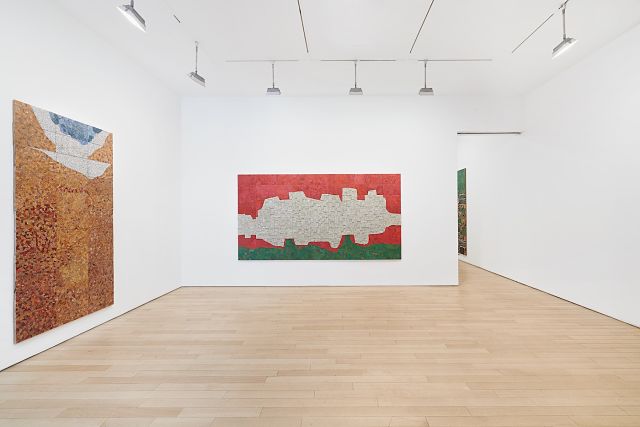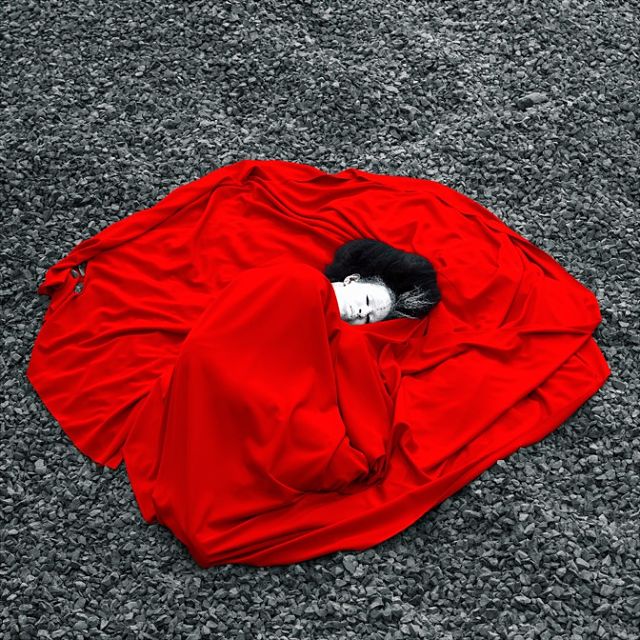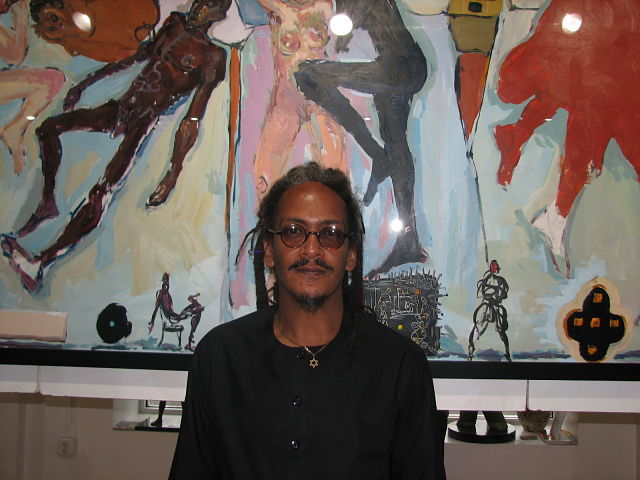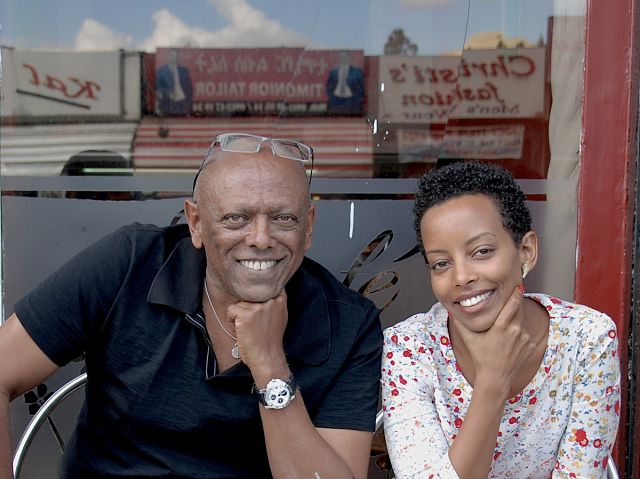Tadias Magazine
By Liben Eabisa

Published: June 17th, 2019
New York (TADIAS) — From New York to Chicago and London this summer has seen the opening of several exhibitions and global news coverage profiling Ethiopian artists. Below are a few highlights:
Elias Sime
Elias Sime’s current New York exhibition, Noiseless, at James Cohan gallery continues to receive rave reviews before it closes on June 29th. Most recently Sime’s exhibit was featured in Brooklyn-based online arts magazine Hyperallergic, which notes that the Ethiopian artist “makes wall sculptures from castoff computer parts that evoke the toxic dumping of these materials around the world.” In the review titled “Mosaics of Motherboards, Keyboards, and Wire” the writer John Yau says that Sime’s ‘Tightrope: I BURNED IT’ piece is among his favorite and shares that “it is made of hundreds of tiles covered in different hues of red, white, blue, and green insulated wire, woven into patterns and abstract configurations that are unique to each piece” adding “I don’t remember ever seeing Simes do anything like this before. He is always methodical and meticulous, but when he is pictorial and uses the computer components toward pictorial ends, he begins to lose me…This disruption infuses the work with staying power, as it pulls us into the realm of speculation and reflection.”

“Elias Sime: NOISELESS” at James Cohan Gallery, Chelsea, installation view: left: “Tightrope: Noiseless 23” (2019); center: “Tightrope: Noiseless 10” (2019)
As Tadias magazine reported a few weeks ago Elias is also gearing up for his first traveling U.S. museum exhibition later this year. The inaugural show will take place at the Wellin Museum of Art at Hamilton College from September 7 through December 8, 2019 and will feature a collection of his work created in the past ten years. According to organizers the exhibit entitled Elias Sime: Tightrope includes “a large outdoor site-specific sculpture, created out of repurposed computer parts, electrical wires, bronze and clay.”
Aida Muluneh
In its June issue The Atlantic magazine features an insightful piece by journalist Hannah Giorgis, who covers culture for the American publication, titled “The Photographer Fighting Visual Clichés of Africa,” and highlighting Aida Muluneh as “one of Ethiopia’s reigning image-makers.” Aida, who is a former Washington Post photojournalist and a New Yorker tells Hannah: “You can’t fantasize about making an impact in Ethiopia by being in New York or somewhere else…You have to actually be on the ground.” Hannah adds that “Muluneh’s vibrant acuity, as disorienting as it is alluring, has the power to evoke a place—Africa—and at the same time subvert conventional ideas about it.”

Denkinesh/Part One. (Aïda Muluneh)
You can read Hannah’s full article at theatlantic.com.
Merid Tafese
The work of Ethiopian artist Merid Tafese and his solo exhibit at Gallery Guichard in Chicago was also featured in Rollingout Magazine, which covers music, politics and culture with a focus on the African American community.
“For Merid Tafese his fondest memories are of his father’s extensive book collection, which would play a major role in him becoming an artist” the article notes. Merid’s exhibition is called “A Stream of Consciousness,” and as he told the magazine this is the first time in his two-decade career as a contemporary artist that he is represented by a gallery. “And the fact that the gallery is a Black-owned gallery makes it even more special,” Merid says. Merid’s work in this exhibit includes “a collection of easily five years work and change of medium, thought, mood.”

Artist Merid Tafese (Photo credit: Tony Binns for Steed Media)
Reflecting on the influence of his father’s international book collection on his work as an artist Merid — who is the sixth generation direct descendant of King Sahle Selassie — notes that “[At] a time of fear, terror and being disconnected from the rest of the planet, the collection of books was my scope to look beyond what was happening in my beloved country in the Dergue military junta time. [In] the same way, my art was my outlet and the only free space to be creative and say anything I want. So both the books and my creative process of doing art worked hand-in-hand contributed to my development as an artist.”
You can read Rollingout’s full interview with Merid Tafese here.
Julie Mehretu, Kebedech Tekleab and Mezgebu Tesema
The Wallace Art Gallery at Columbia University in NYC also has group show exhibiting the work of ten international artists including three who are Ethiopian: Julie Mehretu, Kebedech Tekleab and Mezgebu Tesema. The exhibit, which opened on Friday, June 14th is titled ‘After the End: Timing Socialism in Contemporary African Art’ and focuses on “how temporality shapes new forms of politics, history, subjectivity and the turn to neoliberal global politics.” According to the gallery “It features artists looking at countries including Angola, Ethiopia, Guinea-Bissau and Mozambique. Less than thirty years since independence from colonialism, the end of the Cold War brought down socialist governments and sparked a wave of upheaval among young African nations. The need to reimagine national narratives gave rise to a generation of artists that seek to make sense of the dramatic shifts witnessed by their countries.” The show is on view through October 13th, 2019.
Addis Fine Art’s Mesai Haileleul and Rakeb Sile

Founders of Addis Fine Art Mesai Haileleul & Rakeb Sile. (Photo: Addis Fine Art)
Last, but not least, the Addis Fine Art gallery, which was established only three years ago by Mesai Haileleul and Rakeb Sile, has been cited by Artsy – the online art collection and education platform — as being among the 27 rising galleries from around the world that are “shifting the global conversation around contemporary art.”
Addis Fine Art is Ethiopia’s first gallery to focus on contemporary art from Ethiopia and its Diaspora. Artsy notes: “It took an art dealer in Los Angeles and a business consultant in London to create Ethiopia’s most exciting young gallery. After attending the 1-54 African Art Fair in London, Rakeb Sile wondered why there weren’t more Ethiopian artists who were globally known. She discovered Mesai Haileleul, a gallery owner who had been in L.A. for 30 years selling Ethiopian art, and had not returned to his home country in decades. Sile went to L.A. to find him and lured him back to Africa, convincing him to dive into the local art market. The two opened a gallery in Addis Ababa, and it quickly became the go-to place for Ethiopian art, especially after opening a sister space in London to connect the artists with collectors in European markets.”
You can read the Q&A with Mesai and Rakeb at artsy.net.
—
Related:
Art Talk: Photojournalist Michael Tsegaye’s U.S. Exhibit ‘Crooked River’
In Pictures: Ethiopian Festival at the Children’s Museum of the Arts in NYC
Spotlight: ZAAF Fashion Photos Shot in Afar, Ethiopia at Smithsonian in DC
Liben Eabisa is Co-Founder & Publisher of Tadias.